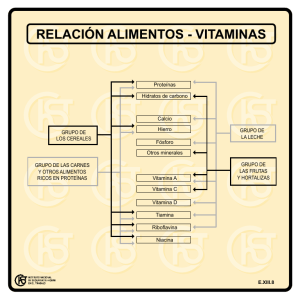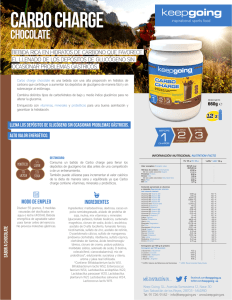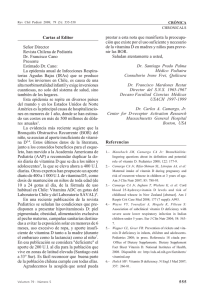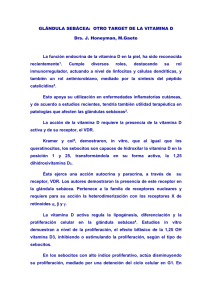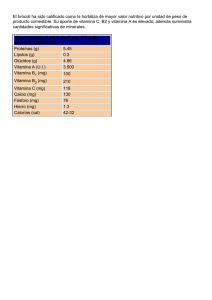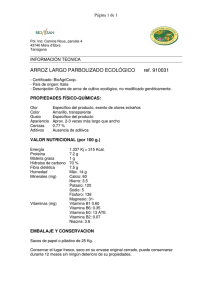Protect Your Baby from Bleeds – Talk to Your Doctor about Vitamin K
Anuncio
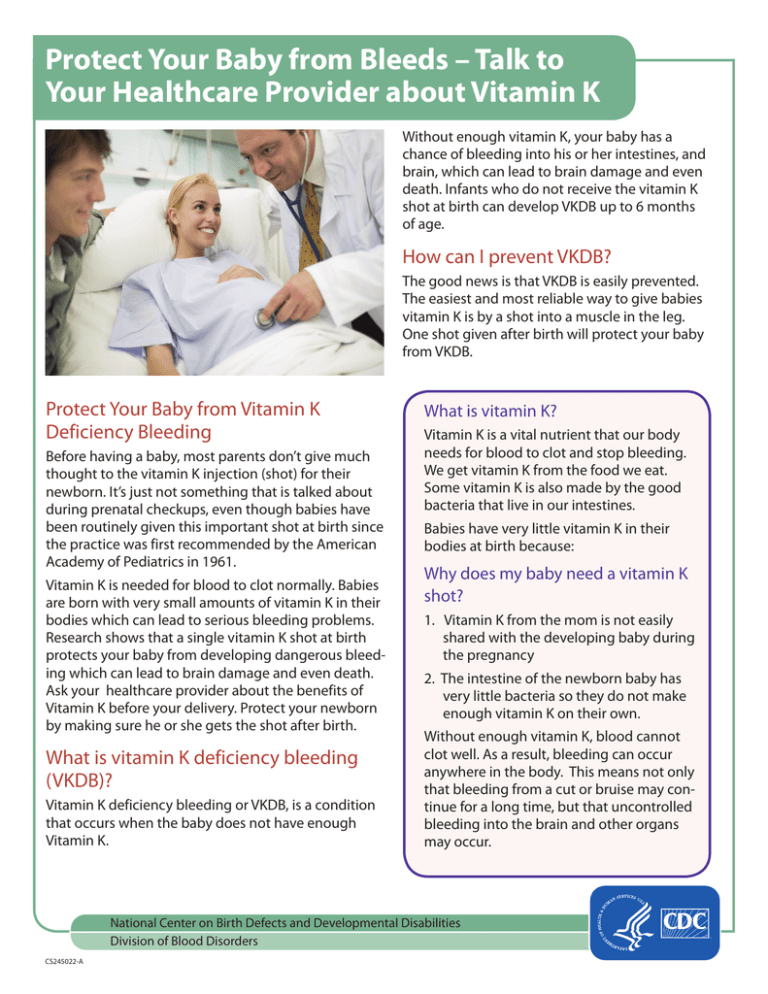
Protect Your Baby from Bleeds – Talk to Your Healthcare Provider about Vitamin K Without enough vitamin K, your baby has a chance of bleeding into his or her intestines, and brain, which can lead to brain damage and even death. Infants who do not receive the vitamin K shot at birth can develop VKDB up to 6 months of age. How can I prevent VKDB? The good news is that VKDB is easily prevented. The easiest and most reliable way to give babies vitamin K is by a shot into a muscle in the leg. One shot given after birth will protect your baby from VKDB. Protect Your Baby from Vitamin K Deficiency Bleeding Before having a baby, most parents don’t give much thought to the vitamin K injection (shot) for their newborn. It’s just not something that is talked about during prenatal checkups, even though babies have been routinely given this important shot at birth since the practice was first recommended by the American Academy of Pediatrics in 1961. Vitamin K is needed for blood to clot normally. Babies are born with very small amounts of vitamin K in their bodies which can lead to serious bleeding problems. Research shows that a single vitamin K shot at birth protects your baby from developing dangerous bleeding which can lead to brain damage and even death. Ask your healthcare provider about the benefits of Vitamin K before your delivery. Protect your newborn by making sure he or she gets the shot after birth. What is vitamin K deficiency bleeding (VKDB)? Vitamin K deficiency bleeding or VKDB, is a condition that occurs when the baby does not have enough Vitamin K. What is vitamin K? Vitamin K is a vital nutrient that our body needs for blood to clot and stop bleeding. We get vitamin K from the food we eat. Some vitamin K is also made by the good bacteria that live in our intestines. Babies have very little vitamin K in their bodies at birth because: Why does my baby need a vitamin K shot? 1. Vitamin K from the mom is not easily shared with the developing baby during the pregnancy 2. The intestine of the newborn baby has very little bacteria so they do not make enough vitamin K on their own. Without enough vitamin K, blood cannot clot well. As a result, bleeding can occur anywhere in the body. This means not only that bleeding from a cut or bruise may continue for a long time, but that uncontrolled bleeding into the brain and other organs may occur. National Center on Birth Defects and Developmental Disabilities Division of Blood Disorders CS245022-A What are the warning signs of VKDB? Is Vitamin K safe? In the majority of cases of VKDB, there are NO WARNING SIGNS at all before a life-threatening bleed starts. Babies who do not get a vitamin K shot at birth might develop any of these signs of VKDB: A study from the early 1990’s found a possible link between getting vitamin K and developing childhood cancer. Pediatricians became very concerned about this and have done many studies since then, in many different ways, trying to see if this link was true. None of the studies found this link again, even though doctors and scientists looked very hard for it. •• Easy bruising especially around the baby’s head and face •• Bleeding from the nose or umbilical cord •• Paler than usual skin color or, for dark skinned babies, pale appearing gums •• Yellow eyes after the baby is 3 weeks old •• Blood in the stool, black tarry stool, or vomiting blood •• Irritability, seizures, excessive sleepiness, or a lot of vomiting may all be signs of bleeding in the brain Does my baby get vitamin K from breast milk? Yes, but not enough to prevent VKDB. There is only a little vitamin K in breast milk. Breastfed babies are low in vitamin K for several weeks until they start eating regular foods, usually at 4-6 months, and until the normal intestinal bacteria start making vitamin K. Should all babies get a vitamin K shot at birth? Did You Know? About half of all babies who develop VKDB bleed into their brains. Yes. Babies do not have enough vitamin K at birth and are, therefore, at risk for having serious bleeding. Thus, it is very important that all babies get a vitamin K shot to prevent VKDB. Where can I get more information? For more information, please visit our website at: http://www.cdc.gov/ncbddd/blooddisorders/index.html Proteja a su bebé de los sangrados: hable con su proveedor de atención médica sobre la vitamina K cuando el bebé no tiene suficiente vitamina K. Sin suficiente cantidad de esta vitamina, su bebé tiene la posibilidad de sufrir un sangrado en sus intestinos y el cerebro, lo que puede causar daño cerebral e incluso la muerte. Los bebés que no reciben la inyección de vitamina K cuando nacen pueden tener un VKDB hasta los 6 meses. ¿Cómo puedo prevenir el VKDB? Cómo proteger a su bebé del sangrado por deficiencia de vitamina K Antes de tener un bebé, la mayoría de los padres no piensa mucho en la inyección de vitamina K para su recién nacido. Es algo de lo que simplemente no se habla durante los chequeos prenatales, aun cuando a los bebés se les ha puesto esta importante inyección — de manera rutinaria, al nacer— desde que la Academia Americana de Pediatría recomendó esta práctica por primera vez en 1961. La vitamina K es necesaria para que la sangre se coagule normalmente. Los bebés nacen con muy poca cantidad de vitamina K en sus organismos lo que puede dar origen a serios problemas de sangrado. Las investigaciones muestran que una sola inyección de vitamina K al nacer protege a su bebé de peligrosos sangrados que pueden causar daño cerebral e incluso la muerte. Pregúntele a su proveedor de atención médica sobre los beneficios de la vitamina K antes del parto. Proteja a su recién nacido asegurándose de que reciba la inyección después de nacer. ¿Qué es el sangrado por deficiencia de vitamina K (VKDB)? La buena noticia es que el VKDB se puede prevenir fácilmente. La manera más fácil y segura de proporcionarles vitamina K a los bebés es con una inyección administrada en un músculo de la pierna. Una sola inyección después de que nazca protegerá a su bebé del VKDB. ¿Qué es la vitamina K? La vitamina K es un nutriente vital que nuestro cuerpo necesita para que la sangre se coagule y para detener un sangrado. Nosotros obtenemos la vitamina K de los alimentos que consumimos. Las bacterias buenas que viven en nuestros intestinos también producen algo de vitamina K. Cuando nacen, los bebés tienen muy poca vitamina K en sus organismos debido a lo siguiente: 1. La vitamina K que tiene la mamá no pasa fácil- mente al bebé en desarrollo durante el embarazo. 2. El intestino del bebé recién nacido tiene muy po- cas bacterias que no producen suficiente vitamina K por sí solas. Sin suficiente vitamina K, la sangre no puede coagularse bien. En consecuencia, puede ocurrir un sangrado en cualquier parte del cuerpo. Esto significa que no solo el sangrado que causa un corte o moretón puede durar por mucho tiempo, sino que es posible que ocurra un sangrado descontrolado en el cerebro o en otros órganos. El sangrado por deficiencia de vitamina K —o VKDB, por sus siglas en inglés— es una afección que ocurre National Center on Birth Defects and Developmental Disabilities Division of Blood Disorders CS245022-B ¿Cuáles son los signos de advertencia del VKDB? En la mayoría de los casos de VKDB, NO HAY NINGÚN SIGNO DE ADVERTENCIA antes de que comience un sangrado que pueda poner en peligro la vida. Los bebés que no reciben una inyección de vitamina K cuando nacen podrían presentar cualquiera de estos signos de VKDB: •• Moretones frecuentes, especialmente en la cabeza y la cara del bebé. •• Sangrado de la nariz o del cordón umbilical. •• Color de piel más pálido de lo normal o encías pálidas, en el caso de los bebés que tienen piel oscura. •• Ojos amarillentos después de que el bebé cumpla 3 semanas de vida. •• Sangre en las heces o en el vómito, heces negras o pegajosas. ¿Sabía usted que...? Casi la mitad de los bebés que tienen VKDB sufren un sangrado en su cerebro. ¿Es segura la vitamina K? Un estudio de comienzos de la década de los 90 encontró un posible vínculo entre recibir vitamina K y presentar cáncer infantil. Los pediatras se preocuparon mucho y desde entonces han realizado numerosos estudios, de distinto tipo, para tratar de determinar si este vínculo es cierto. Ninguno de estos estudios ha hallado este vínculo otra vez, aun cuando los médicos y científicos se han esforzado mucho en su búsqueda. ¿Mi bebé recibe vitamina K de la leche materna? Sí, pero no lo suficiente para prevenir un VKDB porque solo hay una pequeña cantidad de vitamina K en la leche materna. Los bebés que son amamantados tienen poca cantidad de vitamina K durante varias semanas hasta que empiezan a comer alimentos sólidos, por lo general entre los 4 y los 6 meses de vida, y hasta que las bacterias que normalmente están en el intestino comienzan a producir vitamina K. ¿Todos los bebés deben recibir una inyección de vitamina K cuando nacen? Sí. Los bebés no tienen suficiente vitamina K cuando nacen y están, por lo tanto, en riesgo de sufrir sangrados graves. Por eso es muy importante que todos los bebés reciban una inyección de vitamina K para prevenir el VKDB. ¿Dónde puedo obtener más información? Para obtener más información, visite nuestro sitio web en: http://www.cdc.gov/ncbddd/spanish/blooddisorders/index.html
